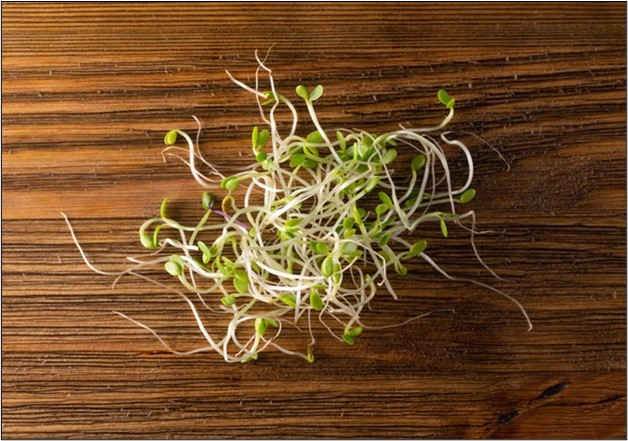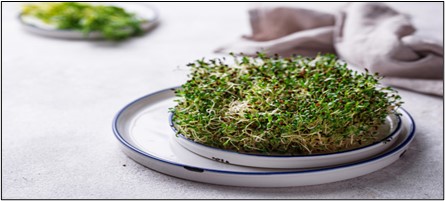Alfalfa is an important medicinal herb traditionally used in Ayurveda for treating digestive disorders and arthritis. It is packed with various micronutrients and antioxidants, which are responsible for promoting the nutritional status.
Nutritional profile
- It contains less amount of carbohydrate but significantly rich in dietary fibre
- It also contains desirable amount of protein
- It contains negligible amount of fat
- It contains various vitamins like Vitamin C, Vitamin B1, B2, B3, B5, B6, B9, choline, betaine, Vitamin A, Vitamin E and Vitamin K
- It also contains several imperative trace elements, which include calcium, phosphorus, sodium, potassium, iron, selenium, zinc, copper, magnesium and manganese
- It contains numerous bioactive compounds such as phytosterol, isoflavonoids, phenolic acid, saponin and flavonoids
Biological properties
- Antioxidant property
- It exerts potent antioxidant activity that helps to prevent cellular damages by preventing oxidative stress and promotes cellular functions
- It helps to decrease the concentration of free radicals and Reactive oxygen species within body that helps to reduce the susceptibility of developing chronic diseases
- Anti-inflammatory property
- It helps to prevent inflammation by decreasing the concentration of inflammatory mediators in blood
- It also helps to inhibit swelling and pain

- Anti-carcinogenic property
- It plays significant role in reducing the susceptibility of carcinoma as it helps to prevent gene mutation
- It is also very effective for reducing the concentration of carcinogens in blood
Health benefits
- Role on immune system
- It helps to boosting up the immunological responses of the body
- Its Vitamin C content plays vital role in strengthening the immune system
- It helps to stimulate the synthesis of WBC
- Role on detoxification
- It helps to stimulate the detoxification process of the body, which helps to decrease the concentration of toxins within blood and helps to make the body healthy
- Apart from eliminating toxins it also helps to eliminate excess salt, fat and water from body
- Role on preventing arthritis
- Pectic polysaccharide is an important anti-inflammatory substance extracted from alfalfa stem plays significant role in preventing joint swelling hence its consumption is very much helpful for reducing the prevalence of osteoarthritis and rheumatoid arthritis
- Ethyl acetate component of alfalfa is also accountable for suppressing the synthesis of pro-inflammatory cytokines that helps to prevent inflammation as well and improves the symptoms of arthritis
- Role on respiratory health

- It has been traditionally used as an effective remedial action for respiratory disorders
- Its antimicrobial activities are responsible for destroying bacteria and viruses hence helps to decrease the susceptibility of developing respiratory infections
- Its anti-inflammatory activities are also accountable for preventing asthma
- It is very effective for reducing the prevalence of bronchitis, common cold and flu
- Role on renal health
- It has diuretic properties that stimulates the elimination of waste products through urine by increasing urination
- It also helps to improve the functionality of kidneys
- It is associated with reducing the risk of developing renal stone
- Consumption of alfalfa is also very effective for improving the health of bladder and prostate
- Role on preventing menopausal symptoms
- It is extremely useful for treating menopausal symptoms as it contains significant amount of phytoestrogen, which acts like estrogen hormone
- Consumption of alfalfa extract is awfully beneficial for preventing the prevalence of vaginal dryness, hot flashes and night sweats
- Role on digestive health
- Its fibre content is responsible for enhancing bowel movement as it helps to increase the bulkiness of stool and also helps to make the stool soft by water retention that results in easy defecation hence improves regularity
- It helps to protect the gastrointestinal tract from inflammatory damages thus reduces the risk of developing inflammatory bowel disease and ulcerative colitis
- It also helps to reduce the prevalence of indigestion, cramping, bloating, and diarrohea

- Role on hepatic health
- Consumption of alfalfa extract is very effective for promoting hepatic health
- It helps to protect liver cell from oxidative and inflammatory damages hence stimulates its functionality
- One of the leading causes of liver damage is recognized as releasing of liver enzymes into blood. Alfalfa helps to decrease the concentration of liver enzyme in blood hence its administration is very much useful to prevent liver damage
- It helps to reduce the prevalence of fatty liver as it helps to decrease blood cholesterol concentration
- Its cholesterol lowering effect is also very helpful for reducing the risk of developing gall stones
- Role on weight management
- Its fibre content is considered as the principal component responsible for preventing obesity
- It helps to increase the rate of fat catabolism, which is related with increasing calorie expenditure thus facilitates weight reduction
- It also provides a feeling of stomach fullness for a long period of time hence helps to reduce appetite results in decreased food intake, which is also responsible for generating a negative energy balance (by decreasing calorie consumption) and makes weight reduction easy

- Role on skin
- It plays significant role in promoting skin health
- It helps to protect the skin from oxidative as well as from inflammatory damages hence reduces the susceptibility of developing skin disorders
- Its chlorophyll content is responsible for cleansing the skin
- It helps to improve skin texture as well as skin complexion
- Role on hair
- Alfalfa contains various nutrients, which play significant role in promoting hair growth
- Consumption of alfalfa (alfalfa seed, sprout and grain) is associated with providing all necessary proteins required for hair growth
- Its B vitamins especially Vitamin B1 and B6 also help in stimulating hair growth
- Vitamin C, calcium, zinc and iron contents of alfalfa help to prevent hair loss
- Its silica content is also accountable for inhibiting baldness of hair

Therapeutic usage
- Its saponin content is responsible for reducing the blood cholesterol concentration hence it should be consumed for obtaining a healthy lipid profile
- It also helps to improve HDL concentration within body that ultimately helps to reduce the risk of developing coronary artery diseases by preventing atherosclerosis
- It is very effective for accelerating healing process as it contains significant amount of Vitamin C
- It also helps to prevent allergies
- It helps to support the function of pituitary gland as well
- It is very effective for re-mineralization of teeth and also helps to prevent tooth decay
- It is extremely beneficial to be consumed by lactating women as it helps to stimulate milk secretion
- It is also associated with preventing morning sickness
- Consumption of alfalfa is very effective for promoting nervous functions as it helps to protect the nerve cells from oxidative damages and helps to decrease the susceptibility of developing neurological disorders
- It plays significant role in improving insulin function and also helps to increase insulin secretion hence helps to decrease blood sugar concentration
- It also helps to promote healthy blood clotting

General consideration of using alfalfa
- It can be consumed with sandwich, salad and smoothie
- Alfalfa sprout can also be consumed
- It can be used for preparing herbal tea or nursing tea
- Overconsumption of alfalfa is harmful for health as it may develop pregnancy related complication and autoimmune diseases, hence it is better to consume alfalfa in moderate amount
Source:
References
Gao, P., Bian, J., Xu, S., Liu, C., Sun, Y., Zhang, G., Li, D. and Liu, X., 2020. Structural features, selenization modification, antioxidant and anti-tumor effects of polysaccharides from alfalfa roots. International Journal of Biological Macromolecules, 149, pp.207-214.
Herbals, E., 2020. How To Increase Your Milk Supply With Alfalfa Leaf| Euphoric Herbals.
Lai, S., Cui, Q., Liu, J., Liu, J. and Sun, D., 2020. Determination and analysis of functional characteristics of alfalfa stems and leaves. Shipin Kexue/Food Science, 41(7), pp.73-78.
Pandey, S., Chaturvedi, N. and Gupta, D., 2019. Effect of Malting on Nutritional Profile of Alfalfa Seeds and Development of Value Added Fermented Products. International Journal of Fermented Foods, 8(2), pp.73-78.
Pocol, C.B., Moldovan Teselios, C., Stan, L. and Pop, I.D., 2016. Alfalfa powder: Healthy food supplement for sustainable consumption. Problems of World Agriculture/Problemy Rolnictwa Światowego, 16(1827-2016-147851), pp.7-17.
Soto-Zarazúa, M.G., Bah, M., Costa, A.S.G., Rodrigues, F., Pimentel, F.B., Rojas-Molina, I., Rojas, A. and Oliveira, M.B.P.P., 2017. Nutraceutical potential of new Alfalfa (Medicago sativa) ingredients for beverage preparations. Journal of medicinal food, 20(10), pp.1039-1046.
SRISAIKHAM, S. and RUPITAK, Q., THE NUTRITIVE VALUE AND BIOACTIVE COMPOUNDS OF ALFALFA (Medicago sativa) GROWN AT BURAPHA UNIVERSITY, SA KAEO CAMPUS. MSU Editorial Board for Proceeding, p.127.


